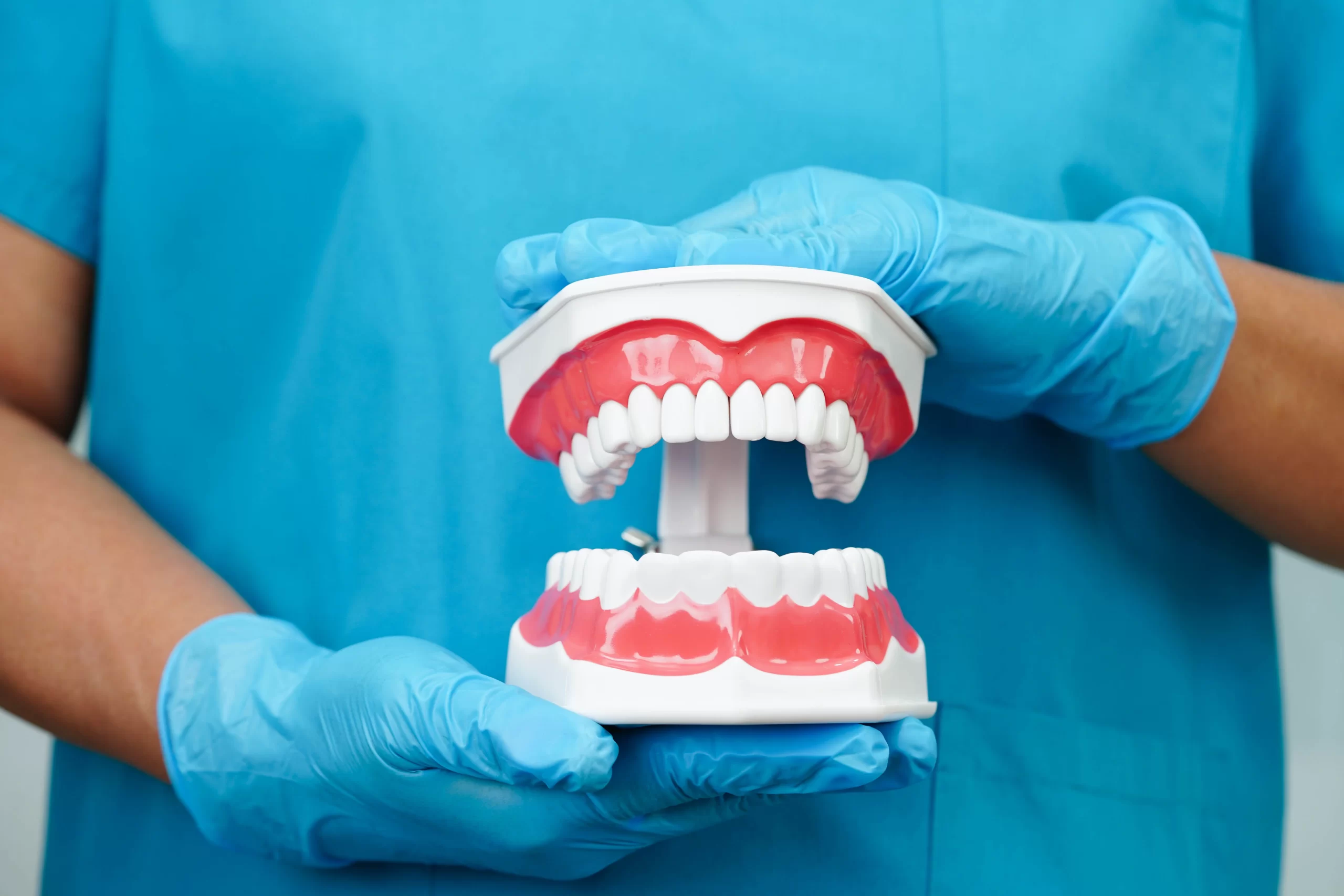Dental implants have revolutionized the field of dentistry in recent years, and for good reason. If you're missing teeth or have teeth that are badly damaged, dental implants can be an excellent solution. They offer a permanent and natural-looking solution to restore your smile and improve your oral health. However, if you're considering dental implants …
Dental implants have revolutionized the field of dentistry in recent years, and for good reason. If you’re missing teeth or have teeth that are badly damaged, dental implants can be an excellent solution. They offer a permanent and natural-looking solution to restore your smile and improve your oral health. However, if you’re considering dental implants for full mouth reconstruction, it’s important to understand the process and what to expect. In this comprehensive guide, we will cover everything you need to know about dental implants, including what they are, how they work, the different types of implants available, and the benefits they offer. So whether you’re missing one tooth or several, read on to learn more about how dental implants can help you achieve a healthy and confident smile.
Introduction to Dental Implants for Full Mouth Reconstruction
Full mouth reconstruction with dental implants is a dental procedure that involves replacing all the teeth in the upper and lower jaw with dental implants. This procedure is suitable for patients who have lost most or all of their teeth due to decay, injury, or other dental conditions. Dental implants are a popular choice for full mouth reconstruction because they are durable, long-lasting, and function just like natural teeth.
The process of full mouth reconstruction with dental implants involves the placement of a series of titanium posts into the jawbone. Once the posts have been placed, a customized set of replacement teeth is fixed onto the posts. This provides a functional and aesthetic solution that closely mimics the look and feel of natural teeth.
In the following sections of this guide, we will discuss the benefits and risks of full mouth reconstruction with dental implants, as well as the different types of implants and procedures available. We will also provide tips on finding a qualified dental professional and what to expect during the recovery period. With this guide, you will be equipped with all the information you need to make an informed decision about full mouth reconstruction with dental implants.
What are dental implants and how do they work?
Dental implants Treatment are the modern solution for replacing missing teeth. They are artificial teeth roots made of titanium that are surgically placed into the jawbone. Once the implant is placed, it begins to integrate with the surrounding bone, a process called osseointegration. This process can take a few months to complete, but it results in a strong and stable foundation for the replacement teeth.
After osseointegration is complete, an abutment is attached to the implant, which serves as a connector between the implant and the replacement tooth. The replacement tooth, also known as a dental crown, is then attached to the abutment.
Dental implants are also versatile and can be used in different ways depending on the patient’s needs. For example, if a patient has lost a significant amount of bone mass in their jaw, they may need a bone graft before the implant can be placed. If a patient is missing multiple teeth in a row, a dental bridge supported by implants may be the best option.
Overall, dental implants are a safe and effective option for full mouth reconstruction. They provide patients with a long-lasting, natural-looking solution for missing teeth that can improve their oral health and quality of life.
Types of dental implants for full mouth reconstruction
When it comes to full mouth dental Implants or full mouth reconstruction, there are several types of dental implants that can be used to achieve the desired results. These include endosteal implants, subperiosteal implants, and zygomatic implants.
Endosteal implants are the most common type of dental implant used for full mouth reconstruction. They are placed directly into the jawbone and are typically made of titanium. Endosteal implants are very secure and can provide a strong foundation for replacement teeth.
Subperiosteal implants are a good option for patients who do not have enough bone density to support endosteal implants. They are placed on top of the jawbone, but underneath the gum line. Subperiosteal implants are not as secure as endosteal implants, but they can still be a good option for some patients.
Zygomatic implants are a more specialized type of dental implant that are used in cases where there is not enough bone in the upper jaw to support traditional implants. Zygomatic implants are anchored in the cheekbone, providing a strong foundation for replacement teeth.
When deciding which type of dental implant is best for full mouth reconstruction, it is important to consider factors such as bone density, overall oral health, and the patient’s individual needs and preferences. A qualified dental professional can help patients determine which type of implant is right for them.
Benefits of dental implants for full mouth reconstruction
Dental implants in Mumbai have revolutionized the field of dentistry when it comes to full mouth reconstruction. If you are missing several or all your teeth, opting for dental implants can be an excellent solution that offers several benefits. Dental implants are essentially artificial tooth roots that are surgically placed into the jawbone to support a replacement tooth or bridge.
Here are some of the key benefits of dental implants for full mouth reconstruction:
A. Improved oral health: Dental implants are designed to mimic the look, feel, and function of natural teeth. This means that they can help you maintain better oral hygiene, reduce the risk of gum disease, and maintain the integrity of your jawbone.
B. Enhanced appearance: Dental implants are customized to match the color, shape, and size of your natural teeth, making them virtually indistinguishable from your real teeth. This can lead to a more attractive smile, improved self-confidence, and a better quality of life.
C. Improved speech: Missing teeth can affect your ability to speak clearly. Dental implants can help you articulate words more clearly and improve your speech.
D. Improved comfort: Unlike traditional dentures, dental implants are fixed into the jawbone, which means they are more comfortable and secure.
E. Long-lasting solution: With proper care and maintenance, dental implants can last for many years and even a lifetime. This makes them a cost-effective and long-term solution for full mouth reconstruction.
Overall, dental implants offer several benefits for full mouth reconstruction that make them an excellent choice for those seeking a permanent and effective replacement for missing teeth.
What to expect during the recovery period
The recovery period after getting dental implants for full mouth reconstruction can vary depending on each individual’s case. However, there are some general guidelines that can help patients understand what to expect during this period.
Firstly, patients experience some mild discomfort and swelling immediately after the procedure. This is completely normal and can be managed with over-the-counter pain medication and ice packs.
It’s important to follow the post-operative instructions provided by your dentist or oral surgeon. This can include avoiding hard or crunchy foods, keeping the implant site clean, and taking antibiotics if prescribed.
Some patients may also experience bruising, but this should subside within a few days.
It’s crucial to attend any follow-up appointments with your dentist or oral surgeon to ensure proper healing and to monitor the progress of the implants. In some cases, temporary restorations may be placed while the implants heal and integrate with the jawbone.
Overall, the recovery period for dental implants for full mouth reconstruction can take several months. But with proper care and attention, patients can expect to have a fully functional and natural-looking smile that can last for many years.
Possible complications and how to minimize them
Like any surgical procedure, dental implant surgery carries risks and potential complications. However, most patients experience a smooth and uneventful recovery. Some possible complications can include infection, nerve damage, implant failure, and bone loss.
To minimize the risks of complications, it is important to choose an experienced and skilled dental implant surgeon who has a good track record of success and does a thorough analysis and treatment planning using digital scans and software. Additionally, patients should follow all pre and post-operative instructions provided by the dentist or oral surgeon. This may include taking antibiotics before and after surgery, avoiding smoking, and maintaining good oral hygiene.
It is also important for patients to be honest about their medical history and any medications they are taking, as this can impact the success of the implant surgery. In some cases, additional procedures such as bone grafting may be necessary to ensure the success of the implant.
Overall, complications from dental implant surgery are rare and can be minimized with proper planning, preparation, and aftercare. Patients should discuss any concerns or questions with their dental implant surgeon prior to the procedure.
How to care for your dental implants after full mouth reconstruction
After undergoing a full mouth reconstruction using dental implants, it is important to take proper care of your new teeth to ensure their longevity and health. Here are some tips on how to care for your dental implants:
A. Brush and floss regularly: Just like with natural teeth, it is important to brush and floss your dental implants regularly to keep them clean and prevent plaque buildup. Use a soft-bristled toothbrush and non-abrasive toothpaste to avoid damaging the implant or surrounding gum tissue.
B. Use an antibacterial mouthwash: An antibacterial mouthwash can help kill bacteria that may cause gum disease or implant failure. Make sure to choose a mouthwash that is alcohol-free to avoid drying out your mouth.
C. Avoid hard or sticky foods: Hard or sticky foods can put extra pressure on your dental implants and may cause damage. Stick to softer, easier-to-chew foods during the healing period after the procedure.
D. Visit your dentist regularly: Regular check-ups with your dentist are important to ensure the health and longevity of your dental implants. Your dentist will be able to identify any potential problems early on and provide treatment to prevent further damage.
By following these tips, you can help ensure that your dental implants last for many years to come and provide you with a beautiful, healthy smile.
Tags -: Dental Implants in Mumbai, Dental Implants Mumbai, Dental Implants Treatment in Mumbai, Dental Implant in Mumbai




